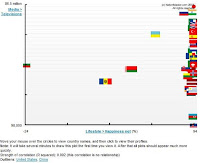In the last post, I discussed how we evolved to look outside ourselves for danger and opportunity, and how this creates a bias when we're looking for happiness. But we bypassed a more fundamental question - what is happiness? It seems like we should know what we're looking for if we want to have any hope of finding it.
I have the belief that Americans have a lot of trouble recognizing happiness, for several reasons. As children, we recognize that getting what you want is more fun than not getting what you want. There is a wisdom in this, actually. We recognize enjoyment and beauty partly because they are often healthy for us. But as we grow, we are bombarded with advertisements that work to subvert this natural wisdom into something unhealthy - we are told that happiness comes from a bottle, a car, a lifestyle. The programs between the commercials are little better - they teach us that happiness comes from how we look, "getting" the girl/boy, and how they look. These reinforce our bias that we should look outside ourselves for a way to be happy, but they also teach us (1) to consume as the method for becoming happy, and (2) that having consumed, we need more, because happiness doesn't last.
This has at least two additional consequences. It trains us to believe that happiness is a special kind of reaction to something, and that happiness is a very strong joyous feeling, like winning the Superbowl.
This is perhaps the most insidious of all the ways our natural wisdom is subverted. We forget that there are many other things that happiness can mean. It can mean comfort, bliss, calmness, contentment, and enjoyment, but we tend to focus only on the more extreme side of elation, ecstasy, and euphoria. By focusing on the extreme version of happiness, which we know can never last (partly because it is extreme), we set up an impossible goal for ourselves. In fact, what strikes me as I see my children buying into this world view, is that getting what you want isn't happiness - it's actually a form of suffering!
When we look outside ourselves for something that will make us happy, what happens when we get it? I don't deny that at the time of receiving it, we feel happiness. We definitely do. If we get that Ferrari we've always wanted, we'll be really happy about it for at least several days. But we also know it will get scratched if we drive it around town. We know some day it will break and cost us a lot to fix it. We worry that others might envy us for it. And after we've had it for a while, we become bored and start looking for something else that can make us feel as excited and happy as we once were with this.
Because the idea of happiness has been so co-opted by Hallmark, Disney, and movies like My Big Fat Greek Wedding, we haven't even questioned if part of the reason we feel unfulfilled so much of the time is because we are looking for the wrong thing.
Let me suggest a different definition of happiness, and see if you agree with me that it is both worth pursuing and more attainable than the ever-shifting definition that happiness is getting the right product/experience/person. As I have grown in my practice, I have come to believe that what we really mean when we say we want to be happy is that we want "ease." We want to be able to move through our days, our work, our challenges, our difficulties, our bodies, and our relationships with ease. We want to have harmony with our minds, feelings, actions. We want to be "in tune" with our friends, spouses, children, bosses, students, etc. We actually don't want to sit on a beach all day every day sipping fruity drinks with paper umbrellas. Sure, that's fun for a while, but most of us would probably start feeling unproductive, disconnected, and out of sync with others. We want to be involved in all the parts of our lives, but we want to be able to go through them with ease. When we are successful at this, we feel a great sense of contentment, achievement, and some joy -- namely, happiness. When we are frustrated in our goals, have arguments with our family or co-workers, we feel ill at ease. When our bodies get out of sync, we have dis-ease. In fact, when we're not sick or injured, we're at such ease that we don't even usually notice how remarkable the sense of ease is - our bodies just do what we want easily.

As long as we continue to believe the lie that happiness comes from getting the "right" thing, we will never be able to achieve lasting happiness. We are constantly changing, therefore the thing/person that we feel is "right" at this point in time, will not feel the same way in the future. But if our goal is to feel at ease with ourselves, our partners, and our lives, then when we change, that peaceful easy feeling can go with us.
Of course, even if you accept this as a better definition for what we really mean when we say we just want to be happy, it doesn't tell us how to achieve it. Here is where Buddhist practice can really help, as it has many methods to train us in how to become at ease with ourselves and our lives. I'll talk about some in future posts.
I have the belief that Americans have a lot of trouble recognizing happiness, for several reasons. As children, we recognize that getting what you want is more fun than not getting what you want. There is a wisdom in this, actually. We recognize enjoyment and beauty partly because they are often healthy for us. But as we grow, we are bombarded with advertisements that work to subvert this natural wisdom into something unhealthy - we are told that happiness comes from a bottle, a car, a lifestyle. The programs between the commercials are little better - they teach us that happiness comes from how we look, "getting" the girl/boy, and how they look. These reinforce our bias that we should look outside ourselves for a way to be happy, but they also teach us (1) to consume as the method for becoming happy, and (2) that having consumed, we need more, because happiness doesn't last.
This has at least two additional consequences. It trains us to believe that happiness is a special kind of reaction to something, and that happiness is a very strong joyous feeling, like winning the Superbowl.
This is perhaps the most insidious of all the ways our natural wisdom is subverted. We forget that there are many other things that happiness can mean. It can mean comfort, bliss, calmness, contentment, and enjoyment, but we tend to focus only on the more extreme side of elation, ecstasy, and euphoria. By focusing on the extreme version of happiness, which we know can never last (partly because it is extreme), we set up an impossible goal for ourselves. In fact, what strikes me as I see my children buying into this world view, is that getting what you want isn't happiness - it's actually a form of suffering!
When we look outside ourselves for something that will make us happy, what happens when we get it? I don't deny that at the time of receiving it, we feel happiness. We definitely do. If we get that Ferrari we've always wanted, we'll be really happy about it for at least several days. But we also know it will get scratched if we drive it around town. We know some day it will break and cost us a lot to fix it. We worry that others might envy us for it. And after we've had it for a while, we become bored and start looking for something else that can make us feel as excited and happy as we once were with this.
Because the idea of happiness has been so co-opted by Hallmark, Disney, and movies like My Big Fat Greek Wedding, we haven't even questioned if part of the reason we feel unfulfilled so much of the time is because we are looking for the wrong thing.
Let me suggest a different definition of happiness, and see if you agree with me that it is both worth pursuing and more attainable than the ever-shifting definition that happiness is getting the right product/experience/person. As I have grown in my practice, I have come to believe that what we really mean when we say we want to be happy is that we want "ease." We want to be able to move through our days, our work, our challenges, our difficulties, our bodies, and our relationships with ease. We want to have harmony with our minds, feelings, actions. We want to be "in tune" with our friends, spouses, children, bosses, students, etc. We actually don't want to sit on a beach all day every day sipping fruity drinks with paper umbrellas. Sure, that's fun for a while, but most of us would probably start feeling unproductive, disconnected, and out of sync with others. We want to be involved in all the parts of our lives, but we want to be able to go through them with ease. When we are successful at this, we feel a great sense of contentment, achievement, and some joy -- namely, happiness. When we are frustrated in our goals, have arguments with our family or co-workers, we feel ill at ease. When our bodies get out of sync, we have dis-ease. In fact, when we're not sick or injured, we're at such ease that we don't even usually notice how remarkable the sense of ease is - our bodies just do what we want easily.

As long as we continue to believe the lie that happiness comes from getting the "right" thing, we will never be able to achieve lasting happiness. We are constantly changing, therefore the thing/person that we feel is "right" at this point in time, will not feel the same way in the future. But if our goal is to feel at ease with ourselves, our partners, and our lives, then when we change, that peaceful easy feeling can go with us.
Of course, even if you accept this as a better definition for what we really mean when we say we just want to be happy, it doesn't tell us how to achieve it. Here is where Buddhist practice can really help, as it has many methods to train us in how to become at ease with ourselves and our lives. I'll talk about some in future posts.





